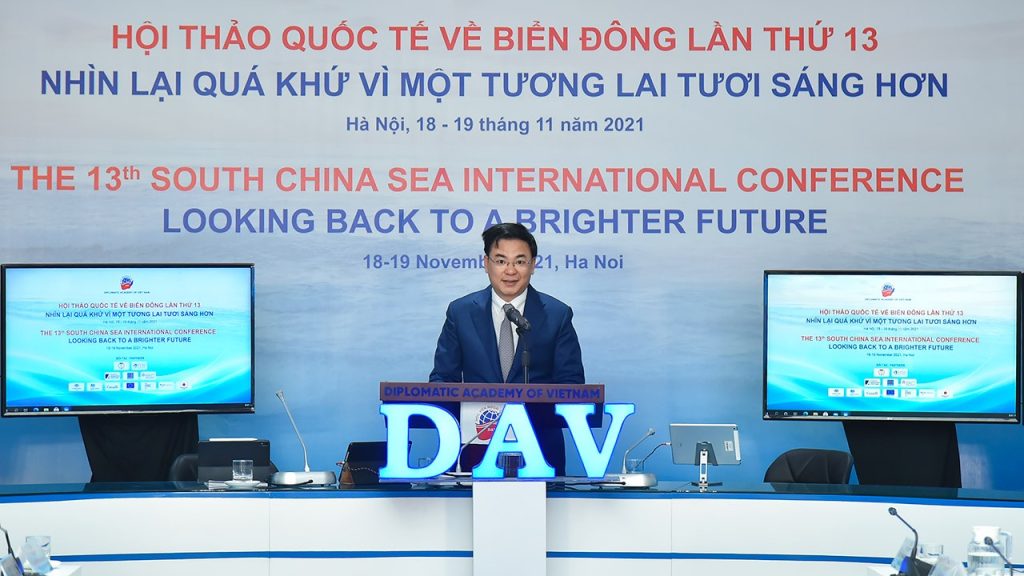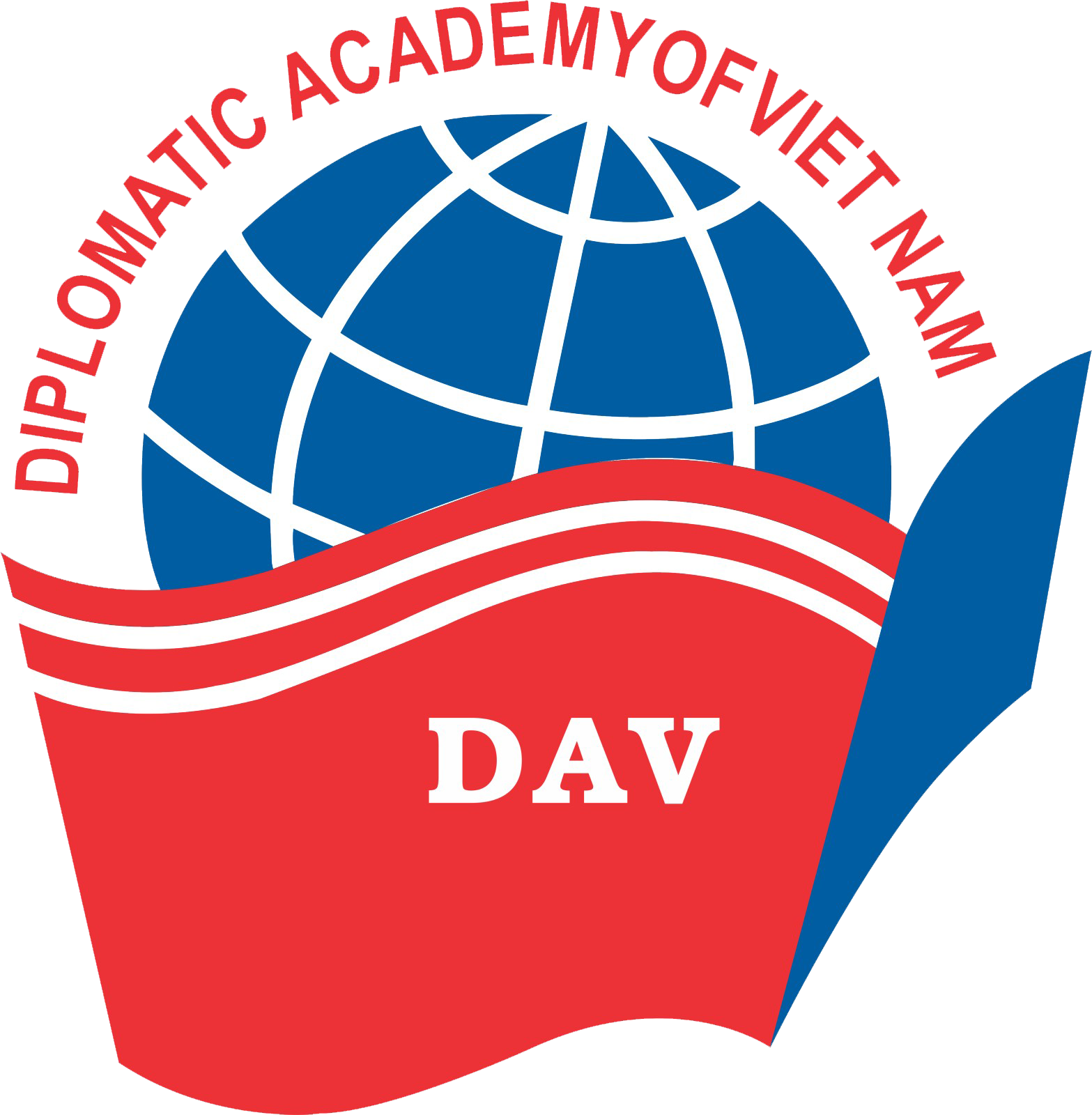
REMARKS BY H.E. MR. PHAM QUANG HIEU
REMARKS BY H.E. MR. PHAM QUANG HIEU,
VICE MINISTER FOR FOREIGN AFFAIRS OF VIETNAM,
AT THE OPENING SESSION OF THE 13TH SOUTH CHINA SEA INTERNATIONAL CONFERENCE
Diplomatic Academy of Vietnam, November 18, 2021
***
“LOOKING BACK TO A BRIGHTER FUTURE”
Dr. Pham Lan Dung, Acting President of the Diplomatic Academy of Vietnam, Your Excellencies, Ambassadors, representatives of the Diplomatic Corps Distinguished guests, Keynote speakers, panelists and online participants
Ladies and Gentlemen,
On behalf of the Ministry of Foreign Affairs of Vietnam, it is my great honor to welcome and thank all of you, Ambassadors, representatives of the Diplomatic Corps, speakers and distinguished guests present at the Diplomatic Academy of Vietnam today, as well as online participants from all over the world, who took time to participate in our 13th South China Sea International Conference under the theme “Looking back to a brighter future”.
I would also like to thank the Diplomatic Academy of Vietnam for inviting me to attend and deliver the opening remarks at this important Conference. In the context of the complicated developments of the Covid-19 pandemic, the continued organization of this Conference has demonstrated that this Conference series has become an indispensable forum for peace, stability and maritime cooperation in the region.
Ladies and Gentlemen,
The South China Sea, located at the heart of the Indo-Pacific region, is clearly a litmus test for peace, stability and cooperation in this vast region. Developments in the South China Sea, positive and welcoming or otherwise, will easily set precedents to be replicated in the entire region, and in other parts of the world. That is because the process of interaction between major countries, between major countries and regional multilateral organizations, and between major countries and international law in general, will have deep and long term implications to world order and and inter-state relations. It can be said without exaggeration that developments in the Indo-Pacific region, and in the South China Sea in particular, would be key indicators of whether the future world order would be that based on rule, multilateralism, transparency and inclusivity, and wheather nations would have equal rights in such global order.
Since last year’s South China Sea Conference, we have been somewhat encouraged by the fact that the atmosphere of frank, constructive dialogue in the South China Sea continues to be maintained between all parties; that international law, especially decisions of jurisdictional authorities and the 1982 United Nations Convention on the Law of the Sea are still widely recognized as an important legal foundation for maintaining order at sea; that the process of negotiation on the Code of Conduct between ASEAN and China has been resumed and certain progress has been made. In addition, all countries are growing aware of the need for cooperation in exploiting scientific and technological advances for green and sustainable development and conservation of the marine environment and space. We are also encouraged when countries near and far are proactively seeking to build a peaceful, prosperous, connected, rules-based Indo-Pacific region and are willing to contribute actively and constructively to regional cooperation activities, including ensuring regional maritime security .
On the other hand, the situation in the South China Sea in the past year has also raised many new concerns. The rapidly increasing number of military activities 3 at sea, undersea, in the air and in space are raising concerns about an arms race and the risk of unintended collisions. Great power competition and the emergence of new security arrangements in the region pose new challenges for the evolving regional architecture, especially to the roles of ASEAN. While UNCLOS 1982 is considered a shared norm of conduct, there are still many national laws or practices that are inconsistent or contrary to UNCLOS. The legitimate rights and interests of coastal states have not been fully respected. This is clearly not conducive to trust and cooperation in the region.
Ladies and Gentlemen,
Over the past year, the Covid-19 pandemic has had a profound impact on all aspects of the world, creating multiple crises with serious consequences to trust and cooperation in international relations. More than ever, the world needs to join hands to overcome the pandemic, realize economic recovery and work towards global goals for a better future.
History has taught us that significant historical moments like these are pivotal ones that can lead us to different futures. Looking back at the history of the South China Sea issue, we have witnessed not only the efforts and achievements of regional countries in maritime delimitation, management of differences, enhanced cooperation to maintain peace and stability at sea, but also a number of conflicts, collisions and not a few unilateral actions that complicate the situation. Throughout this process, Vietnam’s policy line on the South China Sea issue has always been clear and consistent; persistently protecting its legitimate rights and interests, and jointly managing the South China Sea issue with other parties through peaceful measures, in accordance with international law, especially UNCLOS 1982. Vietnam always welcome the efforts of reigonal and extra[1]regional countries to contribute to peace, stability and cooperation in the South China Sea.
The situation in the South China Sea is now at an important junction. This requires us to be very alert, to observe the situation objectively, to make policy recommendations firmly based on historical lessons and scientific studies, and on that basis to narrow the perception gap, increase transparency in the regional strategic environment, minimizing disinformation, thereby strengthening strategic trust and cooperation among all stakeholders.
Therefore, I very much appreciate the selection of this year’s conference theme by the Diplomatic Academy of Vietnam: “Looking back to a brighter future”. The meaning of looking back at the past is not to evoke or revise what happened in the past, but to look for lessons learned, apply them in practice today, and look forward to a better future. As the great scientist Albert Einstein once said: “Learn from yesterday, live for today, hope for tomorrow. The important thing is not to stop questioning.”
With that in mind, I hope the Conference will seek to clarify the followings:
Firstly, works that need to be done in order to strengthen exchanges and dialogue among countries, especially claimant states, to manage differences, find mutually acceptable solutions, and turn the South China Sea into a sea of peace, friendship, cooperation and development; to settle disputes and differences through peaceful means, in accordance with international law, including UNCLOS, through diplomatic and legal processes.
Second, measures to strengthen the maritime order in the South China Sea which is based on international law, especially UNCLOS, such as measures to encourage the parties to seriously comply with their commitments under the DOC, refrain from further complicating the situation and from conducting unilateral activities aimed at changing the status quo in the South China Sea, respect the 1982 United Nations Convention on the Law of the Sea, respect the legitimate rights of stakeholders in the South China Sea on the basis of international law, especially UNCLOS, which is a necessary premise for 5 establishing a rules-based order at sea. What hindrances need to be removed so that the parties can soon achieve an effective and substantive Code of Conduct in the South China Sea, in line with international law and widely supported by the international community?
Third, how to build a regional multilateral security architecture in order to effectively address traditional and non-traditional security threats with ASEAN playing its central role.. A multilateral approach is essential not only for handling regional security issues in general but also for the South China Sea issue in particular. Multilateralism also ensures the legitimate rights and interests of all countries towards a green and sustainable model of management of the South China Sea.
Fourth, measures that can be taken to strengthen maritime cooperation in various fields, promote the application of science and technology to marine management, especially the blue economy in order to restore economic development and supply chain at sea. In the Indo-Pacific region, the restoration of the supply chain post-pandemic depends greatly on the stable, safe and uninterrupted shipping and seaborn traffic. The South China Sea is a connecting space, promoting global trade, and ensuring uninterrupted supply chains, especially ones for strategic commodities. To explore ways to promote the safety and stability of maritime logistics networks, to identify supporting elements such as infrastructure connectivity and port security cooperation, and disrupting elements such as threats to human health in the shipping industry, immigration regulations… are all measures to ensure smooth connectivity and effective maritime cooperation.
Distinghuished delegates,
Ladies and Gentlemen,
During the past 13 years, the South China Sea conference series organized by the Diplomatic Academy of Vietnam has proven to be the leading prestigious forum 6 in the region to discuss peace and cooperation for development in the South China Sea.
With the participation of prestigious experts and scholars in South China Sea studies, along with the active support of the delegates present here and attending online, the Conference will continue to demonstrate the need for dialogue, in the spirit of science, frankness and construction, contribute many ideas and initiatives for strengthening dialogue and cooperation in the South China Sea. It is a valuable source of brainpower for policymakers to learn, absorb, apply, and work towards the common goal of peace, stability and the rule of law in the maritime domain.
In particular, this is the first year that the annual South China Sea Conference is held at the Diplomatic Academy of Vietnam, in the newly completed spacious campus and with the support of modern technical facilities. I hope that this modern campus will be more successful in connecting scholars and creating an environment of open and scientific discussion.
In that spirit, I wish the Conference a great success. I also wish all delegates, distinguished guests, and online participants good health and many achievements in life. I hope the Diplomatic Academy of Vietnam would overcome difficulties and challenges posed by Covid-19, continue to organize the series of increasingly prestigious and quality South China Sea conferences, making practical contributions to the cause of maritime peace and cooperation.
Thank you very much!
